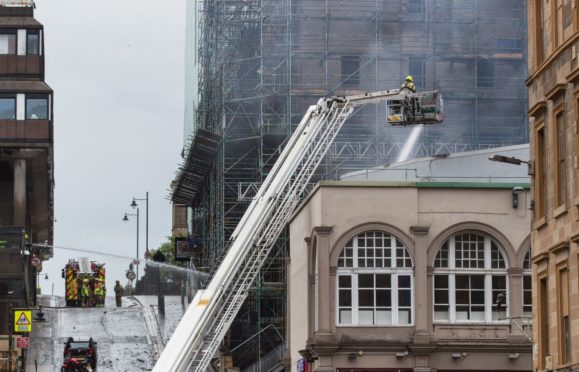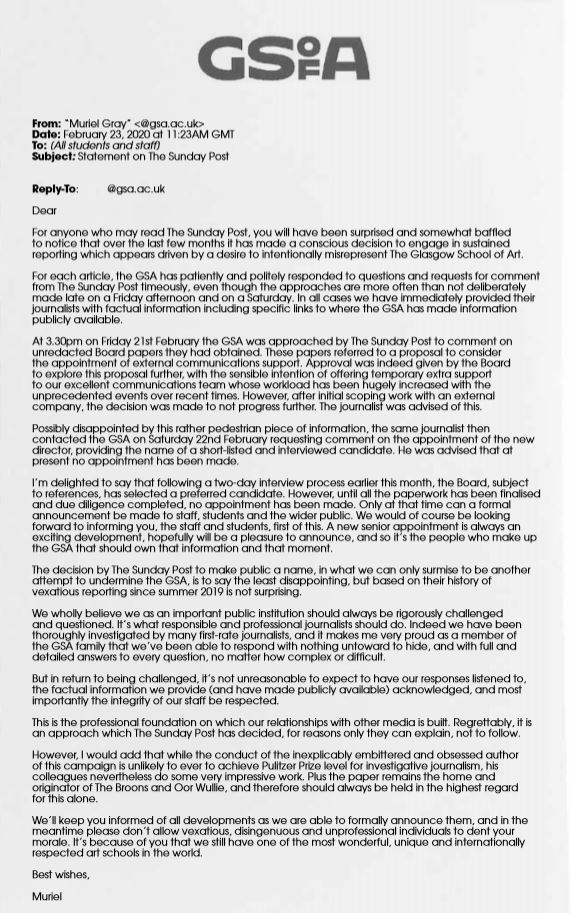
More than £800,000 was paid to staff leaving the Glasgow School of Art after the second devastating blaze in 2018, we can reveal.
The severance and redundancy payments include more than £250,000 given to former director Tom Inns, who departed suddenly after being ordered to leave his office by the school’s chair Muriel Gray.
The pay-offs, some linked to confidentiality agreements – so-called gagging clauses – come after an exodus of 70 staff in 12 months from the school, where an employee survey showed one in three staff felt “unduly stressed” at work and one in eight felt harassed or bullied.
Yesterday, politicians questioned the pay-offs sanctioned by the school, which was given millions of pounds of public money after the first fire in 2014, and said the management and leadership of the school was under mounting scrutiny.
Glasgow MSP Pauline McNeill said: “I think that is an outrageous amount of money to spend at a time like this. The figures are testament to what people have long suspected – that there was a clear-out.
“The question is how the school can be best held to account? What the Glasgow School of Art saga has exposed is the need for better accountability of higher education institutions.
“In particular, the decision to give £250,000 to the outgoing director needs to be justified by the board. There are many people who would have wanted Tom Inns to stay – he was the director at the time of the fire and would have provided some continuity – rather than sending him packing with a quarter of a million pounds in his pocket.”
Joan McAlpine, convenor of the Scottish Parliament culture, tourism, Europe and external relations committee, which has investigated the events around the fire in 2018 that destroyed the world-famous Mackintosh Building, said: “Many people will be concerned at the very significant funds being spent on redundancy pay, particularly given the circumstances around some of these departures. The Sunday Post should be congratulated for exposing this.”
Architect Gordon Gibb, sacked for breach of contract last month after criticising the school board, said: “This is a huge amount of public money and, if the payments are linked to confidentiality clauses, it is hard not to suspect that money has been, in part, used to help conceal managerial failures.”
The Sunday Post previously revealed how in the first 12 months after the second fire, 40 staff had resigned and 30 had been made redundant. Six staff members signed confidentiality agreements.
Yesterday a former member of staff called for the board to be more accountable to academics at the school.
He said: “The way in which decisions are made by the board of governors – with little or no consultation with the academic staff – is sapping morale. The sudden disappearance of Tom Inns happened without any apparent consultation with the academic staff, as did the appointment of professor Irene McAra-McWilliam as temporary director.
“I think it is wrong that the board of governors has such power in what are, essentially, academic matters. Other universities and higher education institutions have senates comprising academics, including all of the professoriate, who provide a counter-balance to the court, which is made up of lay members. Generally, there are widespread mechanisms for democratic participation in decision-making.
“There should be something similar to the senate at The Glasgow School of Art to counter-balance the seemingly unbridled power of the board of governors and its chairperson.”
Meanwhile, hundreds of GSA students have signed a petition about university lecturers’ industrial action, vowing to withhold fees for tuition lost on strike days.
The petition, signed by more than 400 people, states: “We, the undersigned, express an extreme level of discontent for the actions of the board of governors in dealing with the problems faced by GSA in recent years. We do not believe that the director, Irene McAra-McWilliam, has the staff and students’ best interests at heart, but, instead, is furthering the marketisation of The Glasgow School of Art.”
The Sunday Post has published a series of reports about the art school since August when we told how the school launched a global fundraising appeal to “rebuild the Mack” after the first fire in 2014 despite knowing insurance would cover the costs. Instead, £20 million donated was spent on purchasing new buildings and renovating parts of the building untouched by the fire.
Last week we revealed how the school board planned a £370,000 public relations offensive to tackle bad publicity, with more than half the money coming from fire insurance money. In a response sent to staff and students, Ms Gray described our coverage as “vexatious reporting”.
However, Ms McAlpine, whose committee concluded the art school did not give properly prioritise protecting the Mackintosh building after the first fire, said: “It’s the job of journalists to expose information in the public interest, particularly if it’s information powerful people would prefer to keep out of sight. The Post has consistently broken stories about the senior management behaviour at Glasgow School of Art, which we should not forget burned down not once, but twice.”
MSP McNeill said: “I think Muriel Gray needs to consider more carefully about how her actions are viewed by the staff and the public.”
The Art School said it cannot comment on individual staff members or any payments made to them, adding: “In all cases the GSA follows its processes and procedures and complies fully with appropriate legislation. The GSA’s staff turnover is, and remains, in line with the Higher Education sector average and has done so for many years.”
11:23am, last Sunday
We revealed the frontrunner to become the new GSA director last week after we told how the interim director had sought approval for a £370,000 public relations strategy.
Before noon, GSA chair Muriel Gray sent this letter to all staff and students before, two days later, announcing the new director, Penny Macbeth.

Clare Henry: It is not only bricks and mortar that must be rebuilt at troubled art school
The leading art critic on the job ahead for art school’s new director, Penny Macbeth
When the Mackintosh Building caught fire twice in four years, with the 2018 inferno resulting in complete destruction, like many others, I was at first disbelieving then heartbroken.
I was based in Manhattan at the time, and had just donated my written archive to GSA for safe-keeping. I wept the first time, felt anger the second time and, over the last six years, my desperation to see progress, not strife, has grown.
The Mackintosh building was beloved – a treasured masterpiece, an international icon but my sorrow is not just about the building. Since the fires, internal turmoil has added a toxic atmosphere to the damage done, denials of responsibility and multiple questionable sackings left the public bewildered, nearby residents homeless, staff depleted and students stressed.
GSA is in a perilous position. A new director, Penny Macbeth, takes over in May. She is brave indeed. Much depends upon her. Hopefully she will be cool, calm and collected – in contrast to the current aggression and defensive antagonism. Her CV mentions community, empathy and cohesion, all much needed at GSA.
So what are the first essentials for Penny Macbeth when she arrives in two months? She must assure staff their jobs are safe; remove the toxic atmosphere of fear; stop the bullying; reinstate those unfairly sacked; reach out to neighbours; begin a process to separate management of the Mackintosh building from the running of the Art School; and, finally, hand the rebuild of Charles Rennie Mackintosh’s masterpiece to a trust.
The rebuild is, of course, a huge task in itself but there is a vital need to rebuild confidence, heal a damaged spiritual psyche among staff and students and Ms Macbeth should not be expected to be a genius who can handle both.
She is currently the academic lead for Manchester Metropolitan University’s groundbreaking £35 million School of Digital Arts due to open next year, and the GSA board has hailed her ability “to manage significant capital development projects”.
This worried me. I would rather hear about the success she is said to have had at Manchester “across student experience, and engagement with the city and the community”. The same success is most sorely needed here.
I welcome her, wish her all the best and pray she will be a good colleague to staff, an inspiration to students – but not the lead overseer of a building project, a project manager. That job must go to someone else.
An apology
Since Glasgow School of Art suffered a second devastating fire, The Sunday Post has reported extensively on its management and leadership.
Last Sunday, we told how, in a possibly related development, the school’s interim director had sought approval to spend up to £370,000 on a public relations strategy.
Before noon, in response to that 593word story on Page 17, the school’s chair Muriel Gray sent a 683-word letter to all staff and students, criticising The Sunday Post generally and our political editor personally.
We had received no previous complaints about our coverage and we remain satisfied our reporting of the school has been accurate, fair and balanced.
However, after reading and reflecting on her letter, The Sunday Post is happy to accept we have made Ms Gray really, really angry and would like to apologise to her laptop keyboard for any distress we may have caused it.

Enjoy the convenience of having The Sunday Post delivered as a digital ePaper straight to your smartphone, tablet or computer.
Subscribe for only £5.49 a month and enjoy all the benefits of the printed paper as a digital replica.
Subscribe